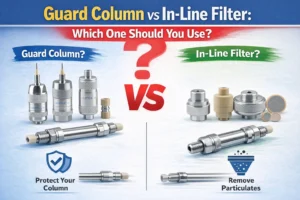
Guard Column vs In-Line Filter: Which One Should You Use?
In HPLC, most performance problems don’t start at the detector — they start before the column. High back
Home » Prep HPLC Columns
When precision and productivity define your separation goals, uHPLCs Prep HPLC Columns deliver unmatched performance from analytical to industrial scale.
Designed for demanding purification workflows, these columns combine high loading capacity, excellent peak resolution, and robust mechanical strength, ensuring reliable results and long service life even under high pressure and repeated use.
Built with premium-grade stainless steel and packed with high-purity silica media, each column undergoes strict QC to guarantee batch-to-batch consistency and reproducibility. Whether you’re isolating APIs, natural products, peptides, or fine chemicals — uHPLCs provides a stable, cost-effective purification solution tailored to your needs.
💡 Key Features
⚙️ Available Sizes
10–300 mm ID | 150–1000 mm Length | 5–30 µm particle size
✨ Engineered for purity, performance, and productivity — from lab to production.

5μm , 150Å / 3.5μm , 150Å
ID10/20/30/50mm * L50 /100/150/200/300mm

5μm , 120Å / 3μm , 120Å / 1.8μm , 120Å ID10/20/30/50mm * L50 /100/150/200/300mm

5μm , 150Å / 3.5μm , 150Å
ID10/20/30/50mm * L50 /100/150/200/300mm
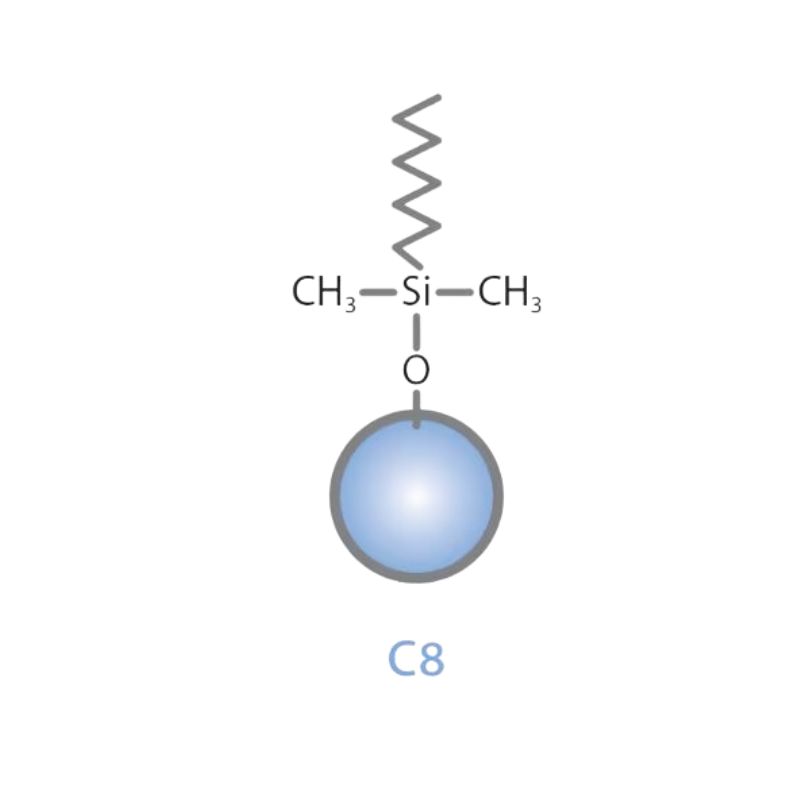
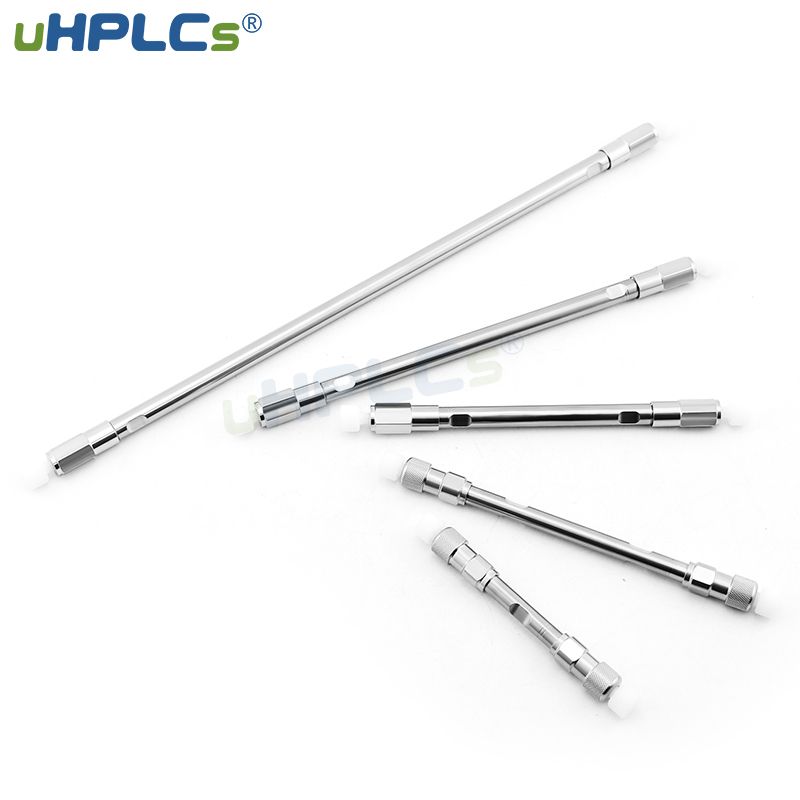
5μm , 150Å / 3.5μm , 150Å
ID10/20/30/50mm * L50 /100/150/200/300mm
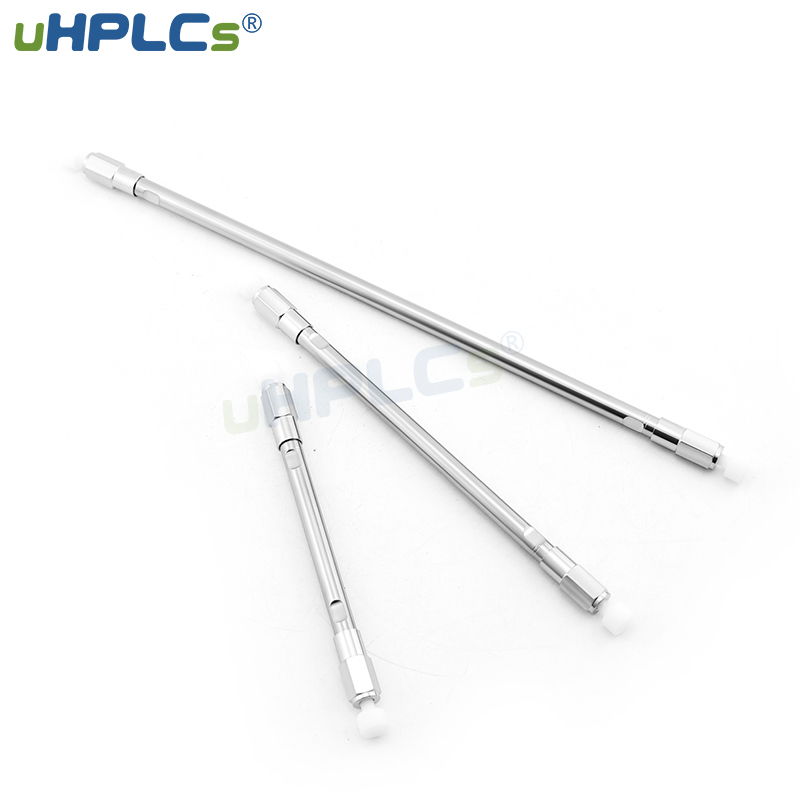
5μm , 120Å / 3μm , 120Å / 1.8μm , 120Å ID10/20/30/50mm * L50 /100/150/200/300mm

5μm , 120Å / 3μm , 120Å / 1.8μm , 120Å ID10/20/30/50mm * L50 /100/150/200/300mm
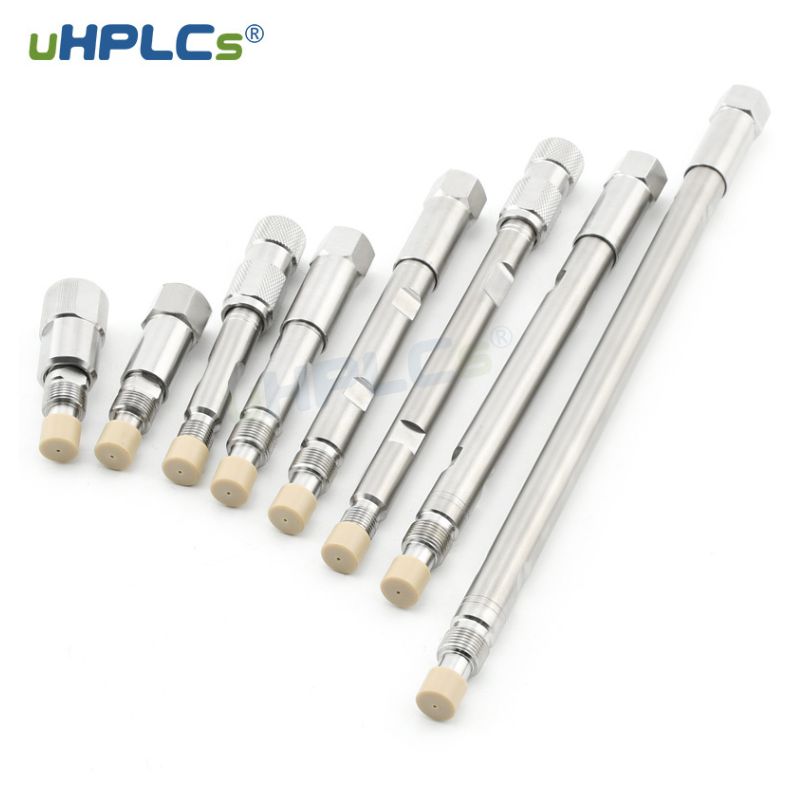
5μm , 120Å / 3μm , 120Å ID10/20/30/50mm * L50 /100/150/200/300mm
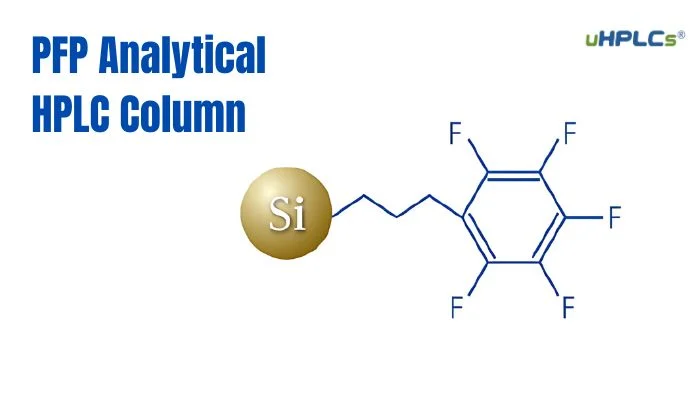
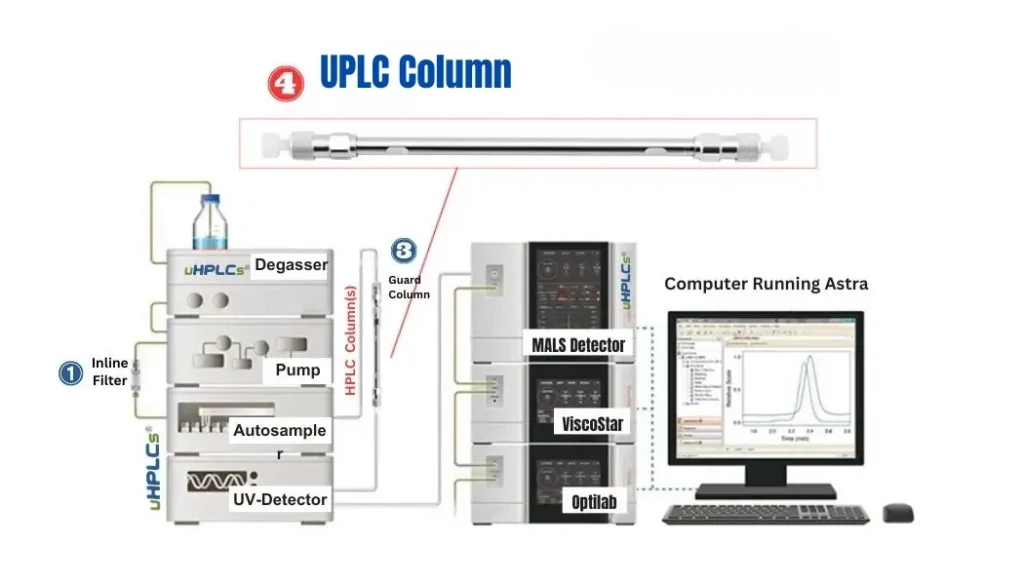
In addition to custom-designed columns, uHPLCs manufactures a comprehensive range of standard UPLC columns for diverse applications, including reversed-phase, normal-phase, ion exchange, size exclusion, and HILIC. We also produce prepacked columns and a full selection of accessories, such as frits, end-fittings, and guard columns, to support a complete chromatography workflow.
With advanced, state-of-the-art manufacturing facilities, uHPLCs has the capability to produce UPLC columns with exceptional precision, consistency, and durability. Our processes combine precision engineering, automated packing technology, and stringent testing to ensure every column delivers superior performance and reproducibility. Backed by a strict quality control program, all our columns meet and exceed CE, SGS, and UL standards, ensuring reliability and accuracy for the most demanding analytical applications.

Experience the Precision and Reliability of Our High-Quality Columns Today

uHPLCs prides itself on providing excellent customer service, both before and after the sale.

Quality is a top priority. We understand that the products we manufacture will be used in critical applications, which is why we take great care to ensure that they are of the highest quality.

uHPLCs specializes in the production of HPLC columns, and we take great care to ensure that the columns we produce are of the highest quality.
uHPLCs is proud to have a dedicated team of highly skilled scientists and engineers specializing in HPLC and UPLC research and development. With extensive industry experience, our R&D team is at the forefront of creating innovative column technologies that address the evolving demands of modern analytical science.
Leveraging deep technical expertise, they continuously optimize column design, packing methods, and material selection to enhance performance, reproducibility, and durability. This commitment ensures that every column we deliver meets the highest standards of quality, giving our customers reliable solutions for even the most challenging applications.
uHPLCs take great pride in the quality of our products and services. To demonstrate our commitment to excellence, we have obtained a number of certifications and patents that attest to the performance and reliability of our offerings. Our certifications include ISO, CE, and SGS standards and our patents showcase our ability to innovate in the field. We invite you to put your trust in us and discover the benefits of using our high-quality and certified products.

We Supply Effective UPLC Column OEM Service, please check if can meet your lab requirements.
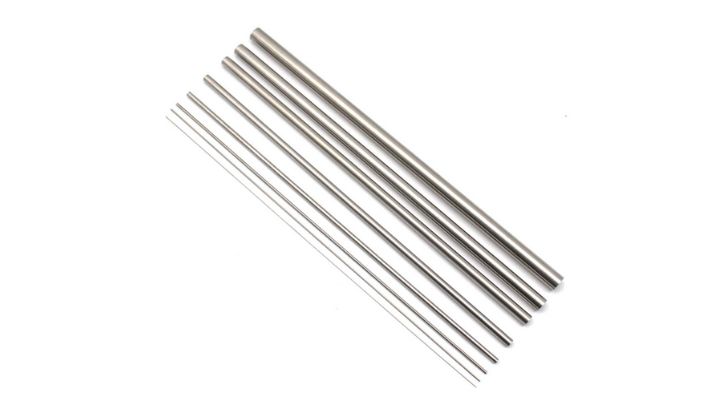
High Quality UPLC Column 316L, 316 Stainless Steel Tube Materials

Design New UPLC Columns 100% As Clients Request

Make UPLC Column Samples And Test Before Mass Products.






High Quality HPLC Column 316L, 316 Stainless Steel Tube Materials

Design New HPLC Columns 100% As Clients Request

Make HPLC Column Samples And Test Before Mass Products.
A Prep HPLC Column (Preparative Column) is designed for purifying or isolating target compounds in larger quantities, rather than just analyzing them.
Compared with analytical columns, prep columns have larger internal diameters (10–300 mm) and higher sample loading capacity, allowing for gram- to kilogram-scale purification. They are widely used in pharmaceuticals, biotechnology, and fine chemicals.

Analytical columns are used for identifying and quantifying compounds at small sample scales (micrograms to milligrams).
Prep columns, on the other hand, are built for purification and collection of compounds in much larger quantities, with higher flow rates and larger particle sizes (typically 5–30 µm).
uHPLCs offers prep columns in 316L stainless steel, PEEK, and glass-lined bodies, packed with high-purity silica media.
Available bonded phases include C18, C8, PFP, Phenyl, HILIC, SEC, and Normal Phase — each optimized for specific separation chemistries and sample types.
uHPLCs Prep Columns are available in sizes from 10 mm to 300 mm internal diameter and 150 mm to 1000 mm length, with particle sizes ranging from 5 µm to 30 µm depending on application scale and resolution requirements.
Prep HPLC Columns are used for purification, isolation, and compound production in:
Active pharmaceutical ingredients (APIs)
Peptides and proteins
Natural product extracts
Fine chemicals and intermediates
Food and cosmetic ingredient purification
Yes. uHPLCs supports OEM and custom manufacturing — including dimensions, bonded phases, particle sizes, and end fittings — to perfectly match your purification system and application requirements.
Column efficiency in UPLC refers to how well a column can separate different compounds into sharp, distinct peaks during chromatography.
It’s a measure of the resolving power of the column — the higher the efficiency, the narrower and better-defined the peaks, which means better separation.
Theoretical Plates (N):
Efficiency is usually expressed as the number of theoretical plates. A “theoretical plate” is a conceptual stage where solute molecules equilibrate between the mobile and stationary phases.
Formula:
N=16(tRWb)2N = 16 \left( \frac{t_R}{W_b} \right)^2N=16(WbtR)2where:
t<sub>R</sub> = retention time of the peak
W<sub>b</sub> = peak width at the base
Height Equivalent to a Theoretical Plate (HETP):
Another way is to calculate HETP:
where:
L = column length
N = theoretical plates
Smaller H values mean better efficiency.
Better Resolution – High efficiency means peaks are narrow and well separated, making it easier to identify and quantify compounds.
Faster Analysis – In UPLC, smaller particle sizes (1.7–1.8 µm) increase efficiency, allowing faster runs without losing resolution.
Lower Solvent Usage – Efficient columns require less mobile phase for the same resolution.
Improved Sensitivity – Narrow peaks increase the signal-to-noise ratio, improving detection limits.
Precision Packing Technology – Uniform, high-density packing of sub-2 µm particles for optimal flow paths.
Strict Particle Size Control – Tight distribution reduces band broadening.
Advanced Column Hardware – Low dead volume end-fittings and frits maintain flow uniformity.
Rigorous Quality Testing – Every column is tested for efficiency and symmetry before shipment.
Proper storage of a UPLC column is essential to maintain performance, extend lifespan, and prevent contamination or degradation of the stationary phase. The storage procedure depends on the column type, mobile phase used, and duration of storage.
1. Short-Term Storage (Daily to Weekly)
If the column will be reused within a few days:
Flush with the initial mobile phase to remove strongly retained compounds.
Keep the column fully capped with end plugs to prevent drying and contamination.
Store upright at room temperature, away from direct sunlight or heat sources.
2. Long-Term Storage (Weeks to Months)
Reversed-Phase Columns (e.g., C18, C8, Phenyl)
Flush with 100% organic solvent (e.g., acetonitrile or methanol) to remove water and avoid microbial growth.
Fill the column completely with the storage solvent (usually ACN or Methanol) before capping tightly.
Store at room temperature in a dust-free, dry environment.
Normal-Phase Columns
Use non-polar organic solvent (e.g., hexane or isopropanol/hexane mix) for storage.
Avoid exposure to moisture — store in a desiccator or sealed bag with desiccant if possible.
HILIC Columns
Store in high-organic content (≥70% acetonitrile) to preserve the stationary phase hydration layer.
Ion Exchange & Size Exclusion Columns
Follow manufacturer’s recommended buffer or preservative for storage (often with sodium azide to prevent microbial growth).
Never allow the column to dry out — always keep it filled with liquid.
3. General Storage Tips
Always cap both ends to prevent solvent evaporation and air bubbles.
Avoid freezing unless specified by the manufacturer.
Label the column with last used mobile phase and storage solvent.
Before reusing after storage, flush with at least 10 column volumes of the mobile phase to equilibrate.
4. uHPLCs Best Practices
At uHPLCs, all UPLC columns are shipped with an appropriate storage solvent and securely capped. We recommend customers follow our included Column Care Guide, which outlines the exact flushing and storage procedures for each column chemistry. This ensures maximum performance, reproducibility, and extended service life.
Prep HPLC Columns are essential for separating and purifying compounds at preparative and production scales.
They are widely used across pharmaceutical, biotech, food, and chemical industries, enabling researchers and manufacturers to isolate high-purity materials efficiently and reproducibly.
| Industry | Typical Use | Example Compounds / Targets |
|---|---|---|
| Pharmaceuticals | Isolation and purification of APIs, intermediates, and impurities | Active pharmaceutical ingredients, enantiomers, drug metabolites |
| Biotechnology | Peptide, protein, and oligonucleotide purification | Recombinant proteins, synthetic peptides, nucleic acids |
| Natural Products & Plant Extracts | Isolation of bioactive compounds | Alkaloids, flavonoids, terpenes, plant-derived actives |
| Fine & Specialty Chemicals | Separation of complex chemical mixtures | Catalysts, intermediates, high-value additives |
| Food & Nutraceuticals | Purification of functional ingredients | Vitamins, amino acids, sugars, antioxidants |
| Analytical & Research Labs | Scale-up from analytical to semi-preparative methods | Method transfer, compound isolation for structure analysis |
Each uHPLCs Prep Column is designed for maximum loading capacity, sharp peak resolution, and stable backpressure, ensuring reliable purification from method development to industrial-scale production.
We use high-purity silica and 316L stainless-steel housing, packed under strict QC protocols to guarantee uniform particle distribution and batch-to-batch consistency.
Every column is pressure-tested and performance-validated before shipment.
From C18, C8, PFP, Phenyl, HILIC, SEC, to Normal Phase, uHPLCs offers customized dimensions (10–300 mm ID) and particle sizes (5–30 µm) to meet diverse purification needs.
Partner with uHPLCs for private-label or OEM supply.
We provide flexible production, global delivery, and competitive pricing — without compromising performance or reliability.
Our chromatography specialists assist with method transfer, scale-up optimization, and custom column selection, ensuring you achieve the best separation efficiency and yield.
✨ uHPLCs — Your Reliable Partner for Precision Purification.
📩 Contact us today: sales@uhplcs.com | 🌐 www.uhplcs.com
As Follow is Some Frequently Questions People Asked
It depends on your sample’s polarity.
C18 columns have longer alkyl chains and are more hydrophobic, providing stronger retention for non-polar compounds.
C8 columns have shorter chains and weaker retention, making them ideal for moderately polar compounds or when faster elution is desired.
➡️ In preparative purification, C18 is most commonly used for general-purpose separations.
HPLC (High-Performance Liquid Chromatography) is a general technique for separating compounds, mainly for analytical quantification.
Prep HPLC focuses on purifying and collecting target compounds in larger quantities (milligrams to kilograms).
Prep HPLC uses larger columns, higher flow rates, and higher loading capacity than analytical HPLC.
A guard column (or pre-column) protects the main analytical or prep column from contamination.
It traps impurities, particulates, and strongly retained compounds, extending the lifespan and stability of the main column.
Prep HPLC is used to isolate, purify, and collect specific compounds from mixtures.
Typical applications include purification of APIs, peptides, proteins, natural products, and fine chemicals — anywhere high purity and recovery are critical.
The Rule of 3 suggests that a compound’s retention factor (k) should ideally be between 2 and 10 for optimal separation.
This ensures peaks are well resolved without excessively long run times — balancing resolution and efficiency.
Dissolve the sample in a compatible solvent.
Filter through a 0.22 or 0.45 µm membrane to remove particulates.
Adjust concentration to avoid overloading the column.
Match solvent polarity with the mobile phase to ensure consistent injection and separation.
Normal Phase HPLC – Polar stationary phase, non-polar mobile phase.
Reverse Phase HPLC (RP-HPLC) – Non-polar stationary phase (like C18), polar mobile phase.
Most modern applications use Reverse Phase due to better reproducibility and versatility.
These refer to the length of the alkyl chain bonded to the silica surface:
C4: Short chain, used for large biomolecules (proteins, peptides).
C8: Medium chain, suitable for moderately polar compounds.
C18: Long chain, ideal for non-polar or hydrophobic compounds.
ODS (Octadecylsilane): Standard C18 phase.
BDS (Base-Deactivated Silica): A modified C18 phase where the silica surface is treated to reduce interaction with basic compounds, improving peak symmetry for amines or polar analytes.
HPLC columns can be categorized by separation mode and phase type:
Reverse Phase (C18, C8, PFP, Phenyl, etc.)
Normal Phase (Silica, Amino, CN)
Ion Exchange (Cation, Anion)
Size Exclusion (SEC, GFC)
HILIC (Hydrophilic Interaction)
Both are C18-based, but T3 columns have lower surface coverage and enhanced polar end-capping, making them more suitable for polar compounds and 100% aqueous mobile phases.
Traditional C18 columns offer stronger hydrophobic retention but may struggle with highly polar analytes.
Contact uHPLCs Today for Any Questions for HPLC / UHPLC

In HPLC, most performance problems don’t start at the detector — they start before the column. High back
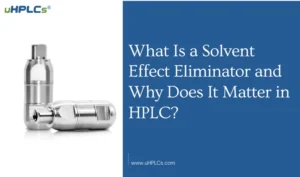
1. Introduction: The Hidden Impact of Solvent Effects in HPLC If you’ve ever observed baseline drift, unexpected baseline

Introduction In high-performance liquid chromatography (HPLC), the choice of an empty column tube is often overlooked, yet it
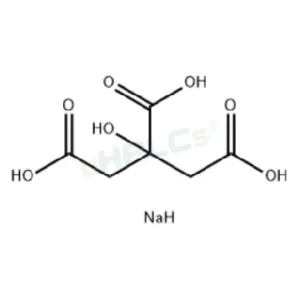
Uridine 5’-triphosphate Trisodium Salt (UTP-Na₃) Reference Standard | CAS 19817-92-6 | High-Purity Reference Materiel Product Code: U-D25015X Chemical

Glutathione (G-SH) Reference Standard | CAS 70-18-8 | High-Purity Reference Materiel Product Code: G-D25016X Chemical Name: Glutathione (G-SH)

Adenosine 5’-triphosphate Disodium Salt Reference Standard | CAS 987-65-5 | High-Purity Reference Materiel Product Code: A-D25014X Chemical Name:

Butafosfan Reference Standard | CAS 17316-67-5 | High-Purity Reference Materiel Product Code: B-D25013X Chemical Name: Butafosfan Category: Drug

Calcium Gluconate Reference Standard | CAS 299-28-5 | High-Purity Reference Materiel Product Code: C-D25012X Chemical Name: Calcium Gluconate

Magnesium L-aspartate Reference Standard | CAS 2068-80-6 | High-Purity Reference Materiel Product Code: M-D25011X Chemical Name: Magnesium L-aspartate
WhatsApp us
Subscribe for exclusive offers and updates on new arrivals